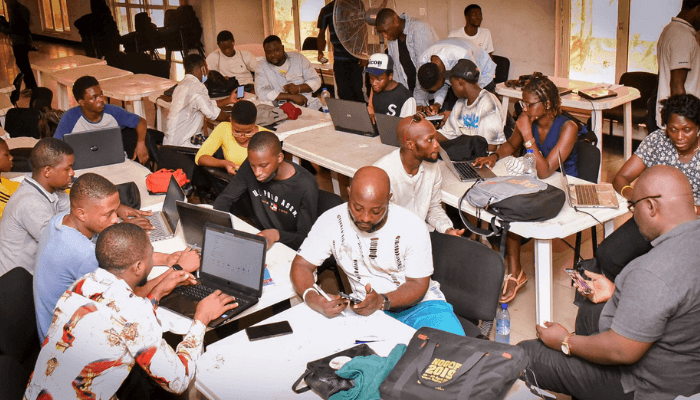In a bold move to deepen digital skills among youth, the Lagos State Government has rolled out a free Software Quality Assurance training programme targeting 600 students and fresh graduates. The initiative, led by the Office of the Senior Special Assistant to the Governor on Students’ Union Affairs (Tertiary Education), is delivered in partnership with Korrekt Tech — a local startup specialising in Quality-as-a-Service solutions.
The training — which runs over three consecutive Saturdays starting October 11 — takes place simultaneously at three venues across Lagos: Lagos State University (Ikorodu), Lagos State University of Education (Otto/Ijanikin), and Lagos State College of Health Technology (Yaba). Sessions run from 9 a.m. to 2 p.m. each day.
According to Kappo Samuel, the Senior Special Assistant to the Governor, the scheme is a strategic expression of Governor Babajide Sanwo-Olu’s THEMES+ agenda — particularly its pillars on education, technology, and youth empowerment.
“This is more than a training — it’s a launchpad to tech excellence,” Kappo declared, describing the programme as part of the administration’s long-term investment in human capital.
“The world is moving in the direction of technology, and Lagos youths are being equipped not to be left behind.”
In his remarks, he emphasised that while demand exceeded expectations, this current cohort will pave the way for future programmes with wider reach.

Table of Contents
Training Aims, Curriculum & Delivery
The software assurance training curriculum covers essential domains such as digital product testing, quality management, and the fundamentals of tech-based service delivery. These are skills increasingly demanded in today’s technology-driven economy, especially as companies scale up digital transformation.
Kappo noted that the programme is targeted at students in tertiary institutions and fresh graduates who aspire to build careers in software development, quality assurance, and related tech fields.
The training is delivered by a team of seasoned QA professionals from Korrekt Tech, led by Ridwan Abdulazeez. The teaching staff includes experts such as Basirat Aboyeji, Adenike Olapetan, Ankoh Idoreyin, Godspower Osayomwanbor, Awodire Oluwatosin, Azeez Wasiu, Olusola Ajibade, Victor Nwauwa, Jumai Tijani, Oluwatomi Ojebuoboh, and Chukwuemeka Uche. These practitioners bring hands-on experience and real-world insights to the cohort.
Participants receive practical exposure to quality assurance best practices, including test design, defect tracking, reporting, and evaluation of software performance. They also engage in project work to apply theoretical knowledge in simulated or real scenarios — thereby building a bridge between classroom and workplace realities.

Challenges, Expectations & Government Commitment
From the outset, registration for the training saw overwhelming interest, according to organisers. Kappo Samuel revealed that more applicants registered than could be accommodated, underscoring the hunger among youth for digital upskilling in Lagos.
He acknowledged this limitation and assured that additional programmes are already in the pipeline to absorb more participants in future phases.
“While we couldn’t accommodate everyone in this phase, our governor is committed to equipping Lagos youths with globally relevant skills,” Kappo said. He applauded the Korrekt Tech team for their dedication and competence in youth development.
Beyond addressing immediate skill gaps, the government anticipates ripple effects: enhancement of employment prospects, stimulation of tech entrepreneurship, and growth of a digitally competent workforce within the state. As Lagos positions itself as a tech hub in Nigeria and Africa, investments like these align with a broader vision for innovation, competitiveness, and inclusive development.
Broader Implications & What to Watch
This free training initiative is emblematic of a growing trend — state governments, NGOs, and private tech firms collaborating to deliver industry-relevant digital skills training to youth. In Nigeria, particularly, where youth unemployment is a major challenge, such efforts can play a critical role in bridging the gap between academic curricula and industry demands.
If successful, Lagos’s programme may spark replication by other states or scale further within Lagos itself. Key metrics to monitor will include:
- Completion and certification rates of participants
- Placement or internship outcomes post-training
- Retention of skills over time (i.e. how many remain active in tech roles)
- Expansion plans for future cohorts
- Partnerships with tech firms or projects to absorb trained youth

The emphasis on software assurance (i.e. quality testing) is strategic: as digital products proliferate — in fintech, e-commerce, government services, and more — the need for robust testing and quality control grows. Graduates of this programme could find pathways into local software houses, tech startups, or global remote work roles.
In summary, by launching a free, well-structured training programme aimed at 600 students and graduates, Lagos State is making a deliberate push to equip young people with in-demand tech skills. The success of this cohort, and the foundation laid for future phases, will likely influence how similar youth upskilling efforts unfold across Nigeria in the years to come.
Join Our Social Media Channels:
WhatsApp: NaijaEyes
Facebook: NaijaEyes
Twitter: NaijaEyes
Instagram: NaijaEyes
TikTok: NaijaEyes




